35+ SAMPLE Trial Agreement
-
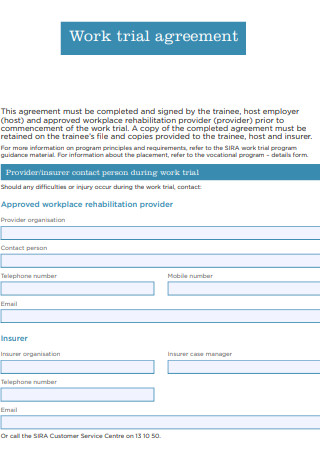
Work Trial Agreement
download now -
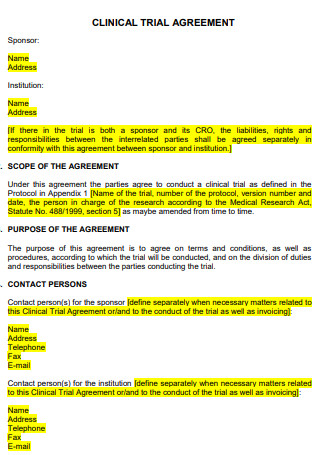
Clinical Trial Agreement
download now -
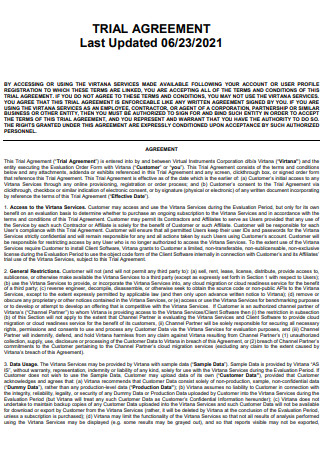
Trial Agreement
download now -
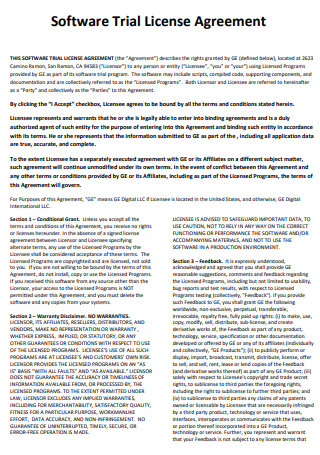
Software Trial License Agreement
download now -
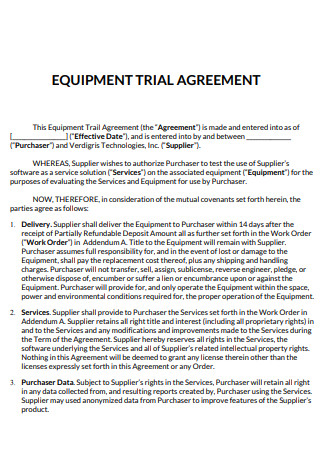
Equipment Trial Agreement
download now -
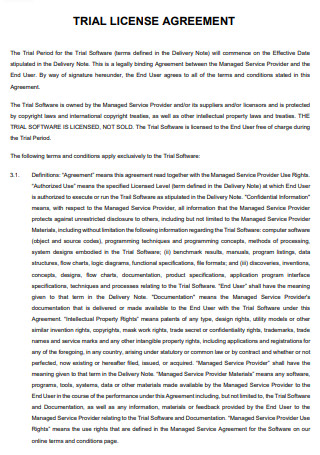
Trial License Agreement
download now -
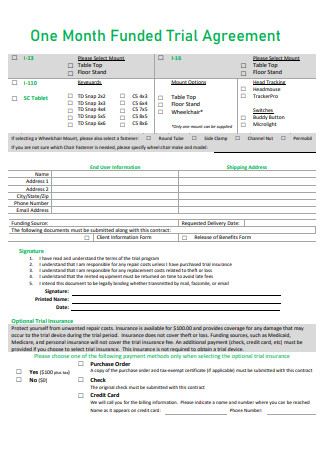
One Month Funded Trial Agreement
download now -
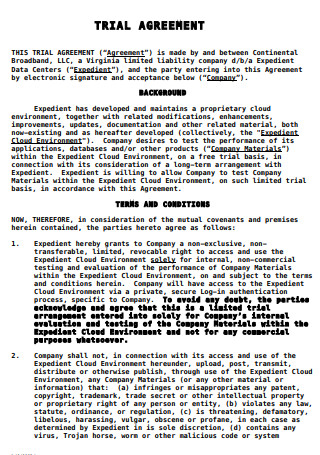
Sample Trial Agreement
download now -
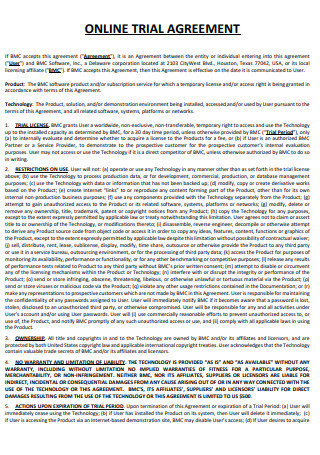
Online Trial Agreement
download now -
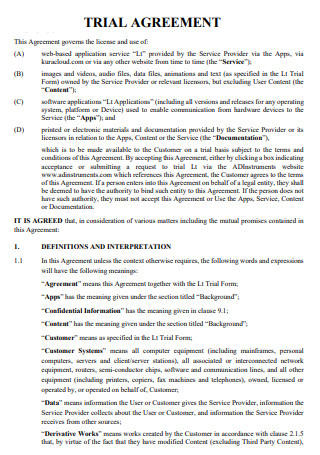
Simple Trial Agreement
download now -
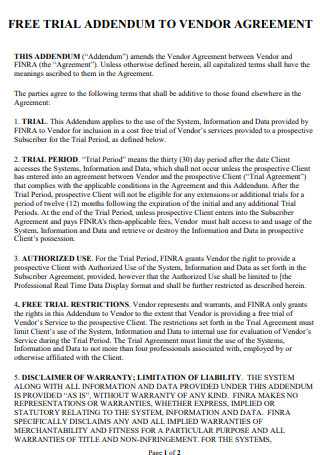
Free Trial Addendum to Vendor Agreement
download now -
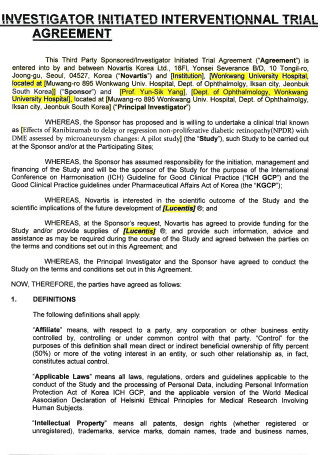
Interventional Trial Agreement
download now -
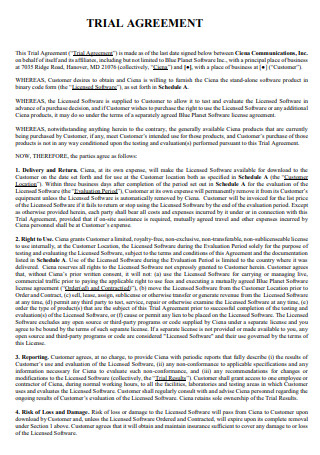
Trial Agreement Example
download now -
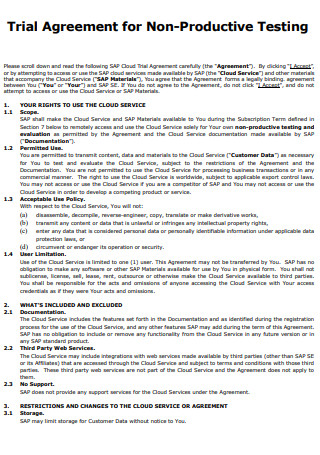
Trial Agreement for Non-Productive Testing
download now -
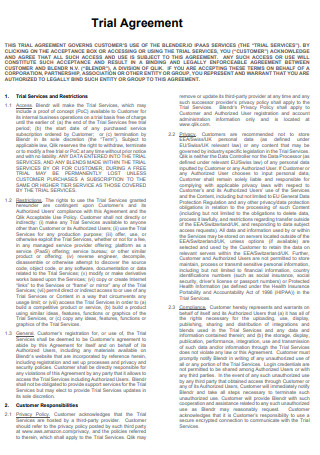
Trial Agreement Template
download now -
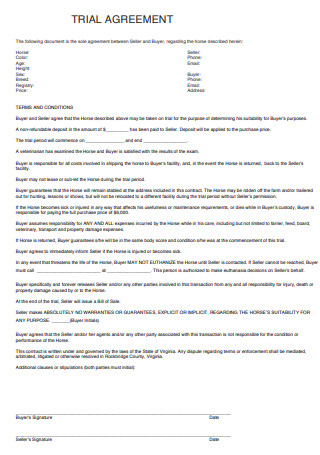
Printable Trial Agreement
download now -
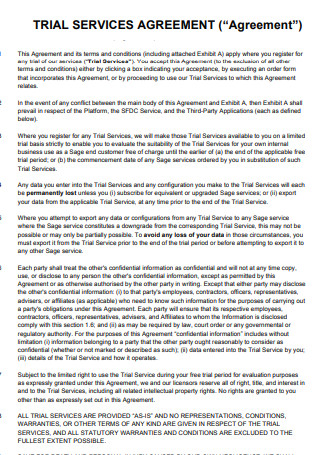
Trial Service Agreement
download now -
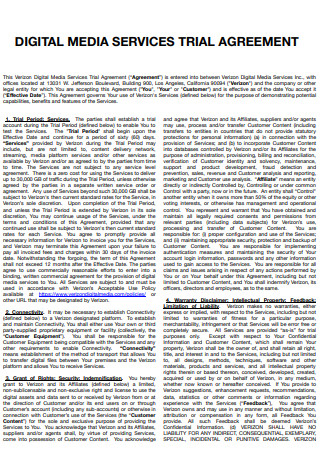
Digital Media Services Trial Agreement
download now -
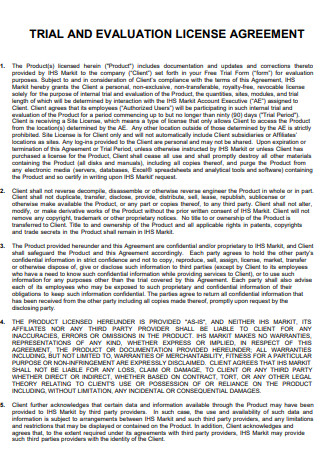
Trial and Evaluation License Agreement
download now -
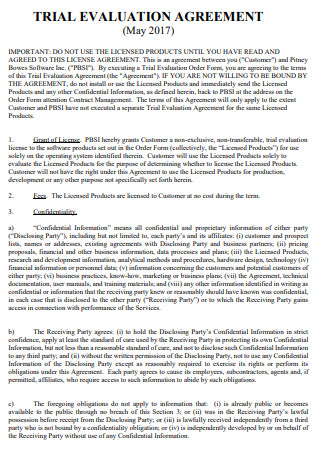
Trial Evaluation Agreement
download now -
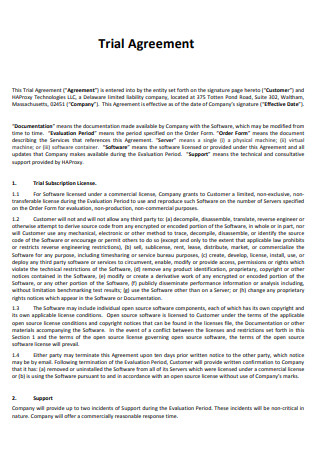
Editable Trial Agreement
download now -
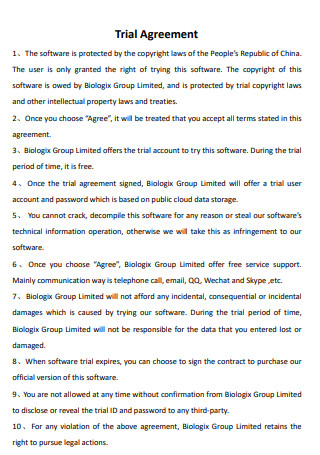
Formal Trial Agreement
download now -
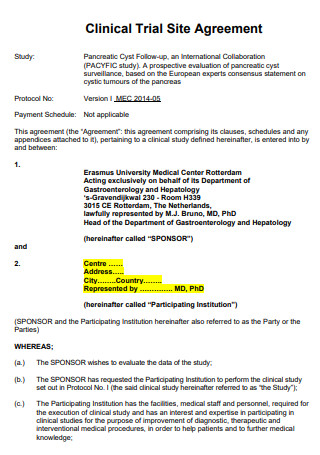
Clinical Trial Site Agreement
download now -
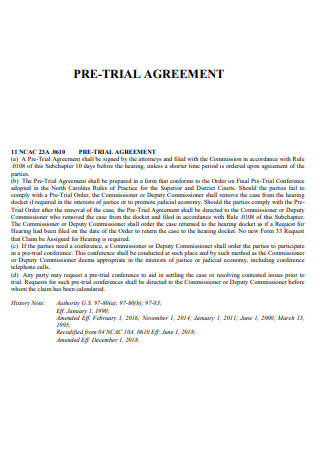
Pre Trial Agreement
download now -
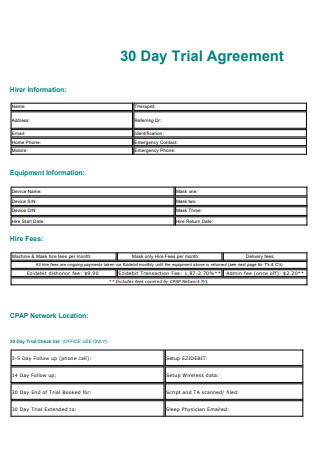
30 Day Trial Agreement
download now -
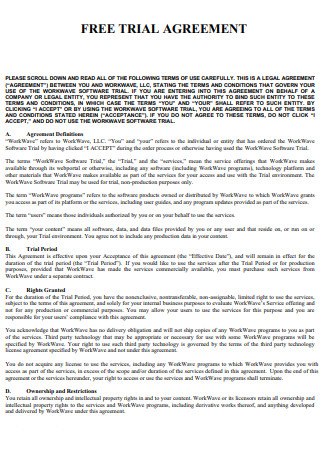
Free Trial Agreement
download now -
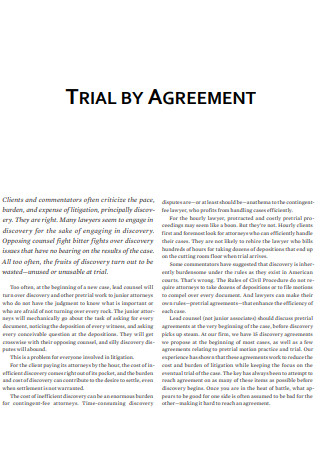
Trial By Agreement
download now -
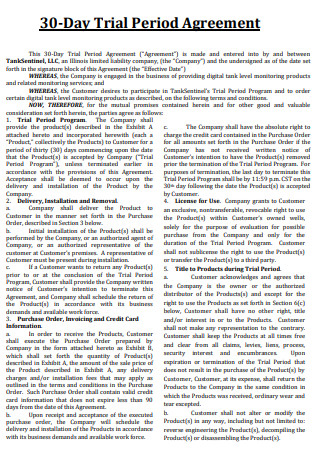
30-Day Trial Period Agreement
download now -
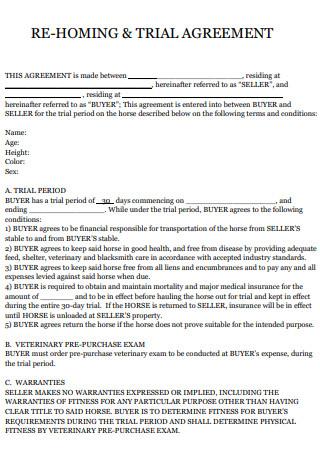
Re-Homing and Trial Agreement
download now -
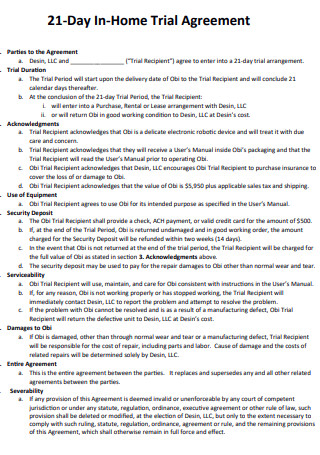
21-Day In-Home Trial Agreement
download now -
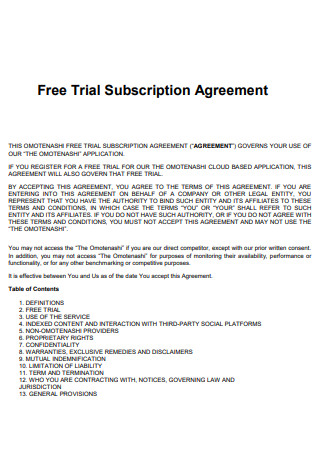
Free Trial Subscription Agreement
download now -
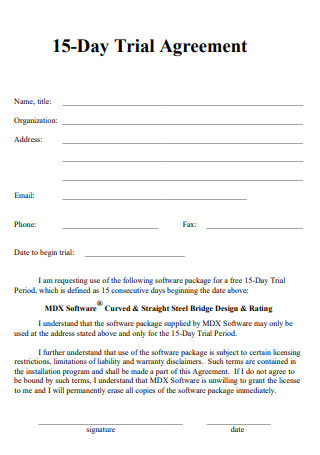
15 Day Trial Agreement
download now -
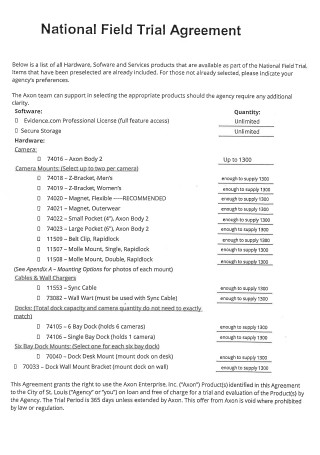
National Field Trial Agreement
download now -
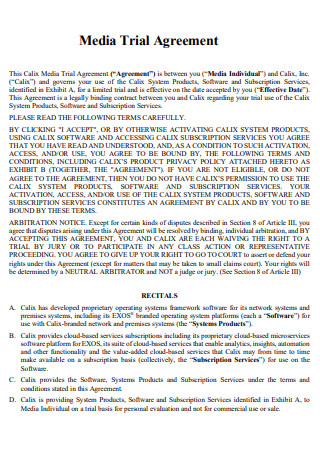
Media Trial Agreement
download now -
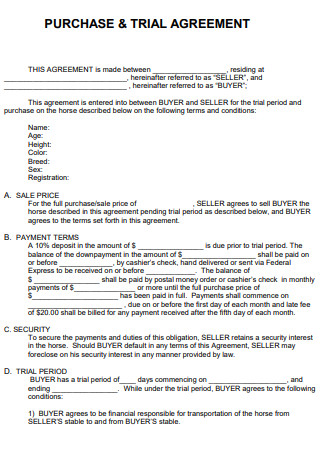
Purchase And Trial Agreement
download now -
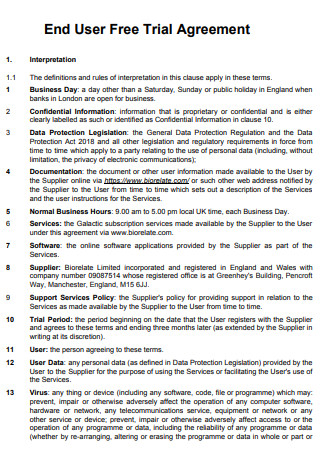
End User Free Trial Agreement
download now
What Is a Trial Agreement?
A trial agreement is a legally binding document that is approved by both the participant and the company or entity conducting the trials. Payment or compensation is also involved. And the potential risks and negative effects demand the participant’s explicit consent. At the same time, there are laws and regulations that govern studies, particularly clinical trials. Thus, the site or company bears responsibility for the trial subjects’ safety and well-being. And all of this is contained in the trial agreement.
According to theisn.org, regulatory agency trials necessitate agreements between the site and the research sponsor or organization. And the contract should be drafted in a way that allows for all parties to understand their rights and responsibilities.
Types of Clinical Trials
Clinical trials are carried out to assess the safety and efficacy of a new medicine, treatment, or medical device. It is a consistent evaluation aimed at discovering a more effective strategy to prevent, diagnose, or treat a condition. As an example, consider vaccines. A vaccine takes between 5 and 10 years to develop. Its safety and efficacy are also being investigated in several clinical studies. Before the regulatory board may authorize it, risk assessments and evaluations must be completed. This is because its effects can either damage or improve someone’s health. There are also countless clinical trials. Let’s go over each of them in turn.
Benefits of Product Trials
It’s time to talk about another type of trial: product trials. Trials are quite prevalent if you work with a computer. Some software offers a free trial period of 15 to 30 days in exchange for a subscription after it expires. Similarly, in certain manufacturing proposals, trials are carried out long before the product is put into mass production. Especially with pharmaceuticals and vaccines. Because the regulatory board must first authorize it. Second, if a risk is posed, manufacturing could be suspended in the middle.
How To Make a Trial Agreement
Similar components are contained in the agreements for different types of trials. The steps outlined below are only broad guidelines for creating various types of trial contracts.
-
Step 1. Description of the Trial
People who wish to engage in the study will want to know why they are doing so. It assists them in weighing the risks and rewards. Transparency might be appreciated by some trial volunteers. As much as feasible, the goal of the experiment should be simplified. Describe each level and the risks it poses. As well as the trial procedure itself.
-
Step 2. Payment
Some trial subjects are not compensated until the trial is completed. Stopping halfway may suggest that no compensation is given. And, if that is the case, the subjects should be informed of it. There are also payment plans in place for the participants. In addition to the amount of money they get paid. Not only should the participants have their own terms, but so should the site of the study. This section should clearly indicate how payments are made and who will receive and give them.
-
Step 3. Responsibilities
The trial site or company is responsible for the safety of their trial subjects. Alternatively, they might provide all of the essential materials and equipment for testing. Most trial subjects are not expected to bring anything with them. It could lead to bias and undermine the trial’s goal. So, the agreement must specify the roles and obligations of both the trial participants and the trial organizer. Perhaps a non-disclosure clause for all parties involved is included in the agreement. That is, the identity of the subjects and the details of the trial will not be made public for a certain period.
-
Step 4. Indemnification and Insurance
Insurance is essential for trial participants, sites, and sponsors. Like when something occurs that causes injury or damage, whether bodily or reputational. Indemnification occurs when the sponsor compensates the trial subject for being harmed because of the trial agreement between the sponsor and the site. So, even though it has nothing to do with them, they are nevertheless impacted by a hypothetical dispute. Insurance simply ensures that they will be reimbursed for any harm that occurs to them.
-
Step 5. Resolution and Termination
Disputes are common in contracts. In most cases, resolutions are also written. This is to avert an escalation and more damage. There could be steps taken to resolve the issue through mutual resolution. There are ground rules in place for termination. It’s also critical that it’s specified. For instance, in the event of fraud or non-compliance with the terms of the agreement. Alternatively, the study may be ended prematurely.
FAQS
Why Is a Trial Agreement Important?
Trial agreements are significant because they define each party’s responsibilities. From the site’s obligation to the participants’ safety and indemnity. Alternatively, perhaps the trial subject’s confidentiality is essential. There are additional payment, termination, and resolution issues to consider. And that must be agreed upon.
What are the Different Kinds of Trial Agreements?
Clinical trial agreements, product trial agreements, work trial agreements, software and equipment trial agreements are some of the most common types of trial agreements. Since there are so many trials, it is necessary to employ a trial agreement pdf.
What Are the Implications of Clinical Trials?
When it comes to testing, experiments, and trials, the participants are vulnerable to serious risks. Participating in experimental treatments and drugs, for example, could have serious and life-threatening consequences. It can also be time intensive and necessitates more focus from the trial subject. They may be required to submit to several blood tests, procedures, and frequent visits to trial locations.
Trials are required to increase safety and ensure that the standards that govern it are followed. There are ethical concerns to consider, as well as the potential harm to trial subjects. And one method to ensure they understand that is through simple and well-written trial agreement. That is why you should get a trial agreement template from Sample.net now!
